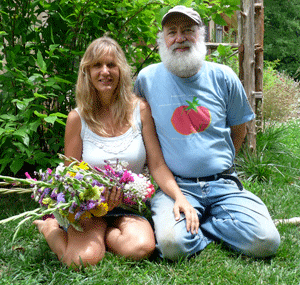by Natalie Swift
Harry LeBlanc is the heart and soul of Beausol Gardens, an innovative three-acre farm near Pittsboro, North Carolina. After spending a sunny afternoon speaking with Harry and weeding strawberries side-by-side with his four interns, I could barely fathom how this seemingly small piece of land could produce and feed such a substantial number of families and individuals. Harry knows, though, and most importantly: he wants others to learn.
Beausol Gardens, located in beautiful Chatham County, produces up to 50 different vegetables and flowers – 100 different varieties – with a unique biodynamic approach. The French word “Beausol” directly translates into pretty soil, a goal that Harry strives for with biodynamic techniques. While Harry “doesn’t pretend to understand” the science behind biodynamic farming, he advocates that his practices produce the rich fruits, vegetables, and flowers that his Community Supported Agriculture (CSA) members have coveted for the past 8 years.
First introduced to farming by his late wife, Julie, he learned the importance of maintaining the soil’s integrity through sustainable practices, whether on his own 200 square foot personal garden or a three-acre farm.
In 1997, while living in Raleigh and working on a small garden, Harry noticed that the bee population was gradually dying off in his own backyard. He later concluded that the chemicals in conventional pesticides were the source of this decline. His eyes now open to the dangers of pesticides, Harry and Julie decided to assure their family’s health by investing in a ¼ acre plot of land in Chatham County, the foundation of Beausol Gardens. This escape from urban life allowed Harry and Julie to embrace farming and feed not only themselves but also their young daughter.
After Julie’s death in 2003, Harry dedicated himself full-time to farming and continued expanding Beausol Gardens. He established a professional relationship with CFSA and began selling his excess products at the Durham Farmers’ Market (where he continues to sell flowers today). After Harry married Deb in 2004 (adding four more children to the family in the process), Beausol Gardens truly took off and began to thrive both economically and spiritually. Their shared vision for the garden led Harry and Deb to expand their plot of land, improve the garden’s infrastructure, and begin investing in other crops and increasing production.
At first, Harry used traditional organic techniques. One year though, for various record-keeping reasons, he realized he could not qualify to be certified organic. During this same time, Harry stumbled upon a unique methodology: biodynamic farming. What is biodynamic farming? Not even Harry entirely knows.
The premise of biodynamic theory is that an individual farmer follows a specific calendar called Stella Natura, wherein specific dates correspond to the planting and tending of certain crops. At first skeptical about its effectiveness, Harry initially implemented the biodynamic philosophy casually. Half-way through a season, he observed the difference in quality between his biodynamically grown crops and his organic crops. This revelation came about when he planted tomatoes on a “fruit day” (according to the calendar) after already planting another row of tomatoes on a day not in accordance to the calendar. Within a few months he observed a difference in the quality of tomatoes that were planted on the correct day. Needless to say, this logical and scientific farmer became a believer and Harry took his farming leap of faith.
Harry’s primary objective with his farm has always been to sustain and preserve the soil. His philosophy is founded upon the idea that “conventional farming depletes soil, organic farming maintains soil, and biodynamic farming improves the soil.” Preserving the soil is the most essential way to ensure that his three-acre plot of land will continue thriving for years to come.
I had to warm up to the practices of biodynamic farming myself, for the manners in which adherents work to preserve the soil and promote crop growth are slightly unconventional. One of these preparations includes placing cow manure into a cow horn, and burying that horn in the soil for several months. According to the biodynamic theory, this technique is supposed to stimulate micro-life and increase the beneficial bacteria in the soil, regulating the nitrogen levels, to ultimately promote root activity. Harry explained this to me with as much bewilderment as you might expect, but, while he insists he still struggles to understand the process, his belief in its effectiveness is truly sincere. The fact is, his crops have thrived under practices such as this, so why change?
Harry’s dedication to replenishing and bettering the soil can be seen throughout the farm. In 2010, he built a greenhouse on the farm, which has been extremely helpful in initiating growth in his crops (especially in the winter months), and he is looking to expand his farmers’ market goods from flowers to a medley of all of his products. Harry utilizes a drip irrigation system in order to reduce disease in the plants by targeting the stem and root of the crops, without creating excess runoff. Organic material, such as plant mulch, wood chips, and straw, keep the soil moist. Rather than applying synthetic fertilizer, Harry maintains the fertility of the soil with cover crops, organic compost, fish emulsions, mined unprocessed meals and other biodynamic preparations.
How humbling is it that three acres and six people can provide enough food not only for themselves but also for the 140 members of their CSA? Harry proves that the process of farming is not merely a physical and logical task, but something that should never be taken for granted. As Harry says, “come and I’ll show you where your food comes from when you buy it from me.”
Natalie Swift wrote this article for a writing class at UNC about local foods.
> Learn more about Beausol Gardens at beausol.com



